Searching for a natural solution to address your skin concerns? It might be time to give propolis a try. Known as “bee glue,” propolis has been a staple in the medicinal kits of ancient civilizations, and it’s making a remarkable comeback in today’s beauty world.
Dive into the regenerative power of propolis and its burgeoning popularity in skincare regimes as you explore the allure of this natural wonder.
The ancient origins and modern science of propolis

With a history that spans across the globe, propolis was not only prized by the Greeks and Romans but also by Persian and Egyptian societies for its health-promoting properties.
These cultures understood early on something that modern science confirms today: propolis isn’t just a protector of beehives; it’s also a potent ally for human skin.
What makes propolis so special for skincare?
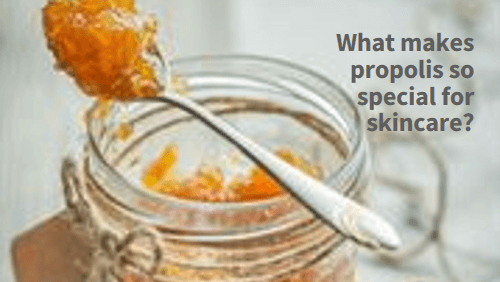
But what exactly makes this sticky, resinous substance so special?
Propolis is made when bees collect plant resins and combine them with their own enzymes. This creates a powerful protective barrier for their hive, capable of fighting off bacteria and other threats.
Intriguingly, the specific benefits of propolis can vary depending on the environment the bees inhabit, which means this natural product comes with its own unique signature of health-promoting compounds.
The multifaceted benefits of propolis for your skin
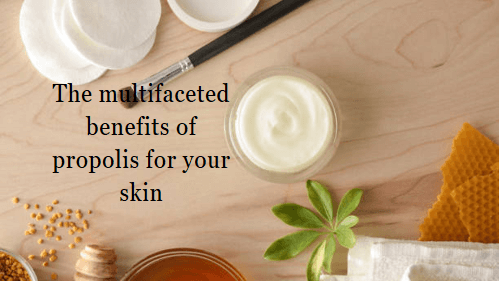
In terms of skincare, consider propolis to be nature’s gift that keeps on giving. Its myriad of beneficial properties stem from the potent combination of vitamins, minerals, and bioflavonoids it contains.
This isn’t just your run-of-the-mill skin treatment; it’s a formidable multitasker renowned for its soothing, healing, and protective capabilities.
Incorporating propolis into your skincare routine
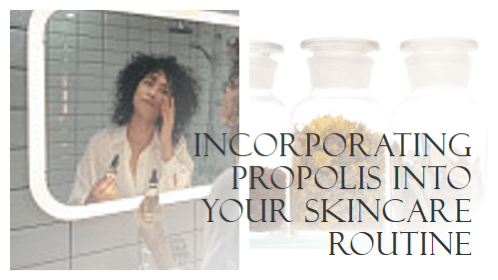
Today, there’s a lot of opportunity in harnessing these natural elements for skincare.
Whether you’re wrestling with persistent issues like acne or simply aiming to maintain your skin’s health and vitality, propolis may just be the ingredient you need.
Transitioning seamlessly, let’s delve into the specific advantages propolis can offer your skin, setting up a roadmap for clearer, more radiant skin.
The Bee’s Secret: Propolis’s Potent Benefits for Your Skin

You might be curious how this substance bees produce can be so powerful for your skin.
Let’s break it down. Propolis is full of compounds that are beneficial for the skin, particularly flavonoids, minerals, amino acids, and vitamins B, C, E, and P. These elements work together to create a shield for the skin, much like they do for the beehive.
How Propolis Can Help You Fight Acne and Blemishes
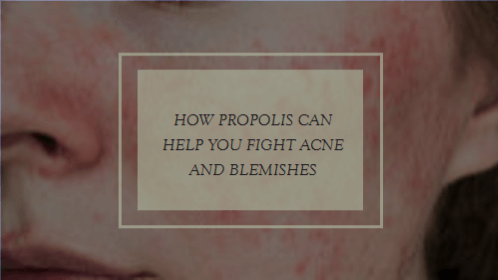
The antiseptic qualities of propolis make it excellent for treating a variety of skin issues.
Have you ever struggled with acne or annoying blemishes? Propolis might help due to its ability to inhibit bacterial growth and reduce inflammation. It’s like having an on-call skin protector to keep those unwelcome visitors at bay.
How Propolis Can Heal and Soothe Your Skin
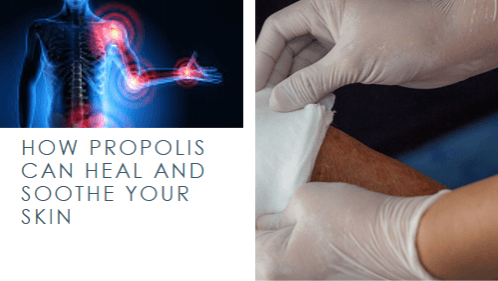
But it isn’t just about fighting acne. The healing properties of propolis extend to wound care as well. It can accelerate the healing process by stimulating cell growth and regeneration.
Plus, those anti-inflammatory properties are great for soothing irritated skin, which is a godsend if you’re dealing with redness or sensitivity.
How Propolis Can Protect Your Skin from UV Damage

Another superhero trait of propolis is its ability to protect your skin from UV radiation. Think of it as an additional layer of defense against the potential damage from those sneaky UV rays.
It’s important, however, to remember that while propolis can support your skin’s health, it doesn’t replace your regular sunscreen.
How Propolis Can Treat Other Skin Concerns

And the benefits don’t stop there. It’s also worth noting that propolis may help with less common skin concerns, such as fungal infections.
Its antifungal properties can be quite effective, offering a natural alternative to over-the-counter treatments.
Testimonials: Propolis is a Skin Care Champion
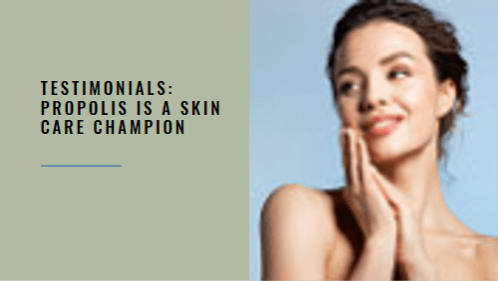
Propolis does its work quietly but effectively, and its impact can be significant.
Individuals with first-hand experience attest to its benefits, often noting improvements in skin clarity, texture, and overall health.
These testimonials, paired with scientific research, shine a light on the potential of propolis as a skin care champion.
Bottling Nature’s Best: Propolis in Korean Skincare Innovations
Now let’s take a closer look at Korean skincare, which is famous for blending traditional wisdom with cutting-edge technology.
In this beautiful landscape, propolis has found a sweet spot. Known for prioritizing gentle, skin-loving ingredients, K-beauty has embraced propolis due to its impressive benefits for the skin.
How Propolis Enhances Korean Skincare Products
Many Korean skincare formulations are infused with this powerful ingredient to enhance their efficacy.
From soothing serums to nourishing overnight masks, each product aims to leverage propolis’s antioxidants and healing properties to deliver healthier, more radiant skin.
Some of the Best Propolis Skincare Solutions from Korea
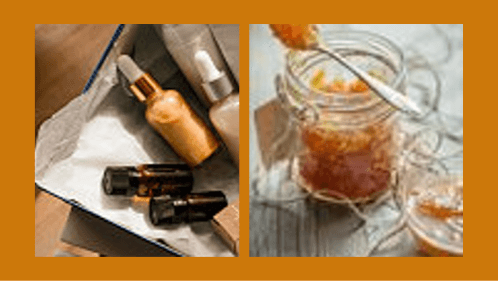
1. Highly-acclaimed propolis skincare solutions include Banila Co’s Miss Flower & Mr. Honey Propolis Rejuvenating Cream, which combines the intense hydration of honey extracts with the brightening effects of niacinamide.
2. Cosrx, another beloved brand in the K-beauty sphere, offers the Propolis Light Ampoule, a serum packed with the goodness of propolis and vitamin B5, designed to provide a lightweight yet substantial hydrating experience.
3. For those who love a pampering session, the Papa Recipe Bombee Honey Sleeping Pack envelops the skin with royal jelly and propolis for an overnight restoration, promising a refreshed and glowing complexion in the morning.
4. And if you’re on the lookout for something indulgent, the VT Gold Honey Progloss Gold Capsule Mask serves up a luxurious treatment with real gold particles and propolis, catering to hydration and anti-aging needs.
How Propolis Skincare Can Elevate Your Beauty Ritual
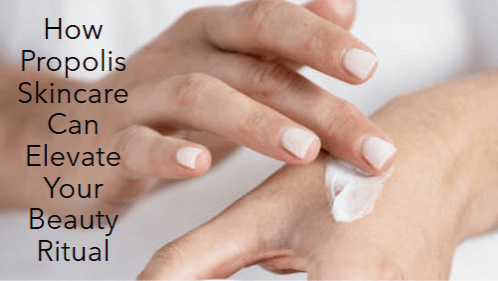
The Trend-Setting Power of Propolis in Korean Skincare: These products showcase how Korea is setting trends, with propolis being a go-to ingredient. Yet, it’s not only about what’s inside the jar. Korean skincare is as much about the ritual as it is about the experience.
The Self-Care Benefits of Propolis Skincare: So when you incorporate a propolis-infused product into your regimen, you’re not only reaping the benefits of the ingredients but also enjoying the self-care aspect that K-beauty celebrates.
Choosing a Propolis Skincare Product That Suits You: Choose something that resonates with you, and remember that your skin will thank you for the extra attention.
Adopting Propolis: Safety, Usage, and Finding What Works for You

I’m going to talk to you about the safety measures and usage of propolis, because knowing this is crucial before you add it to your skincare routine.
1. Use Propolis Safely and Effectively
If you have allergies to bee products, it’s best to avoid propolis. Always do a patch test on your skin to check for any adverse reactions.
2. Incorporate Propolis into Your Skincare Routine
Adding propolis to your skincare can be quite straightforward. For those new to the ingredient, start with a propolis-infused serum or moisturizer. Remember, your first attempt doesn’t need to be your last; you can always adjust your approach down the road.
3. Find the Best Propolis Skincare Product for Your Skin Type and Concerns
Don’t worry too much about trying everything at once. Choose a product that resonates with you, whether that’s due to its additional ingredients or the way it fits into your current regimen. Application is simple: apply topically as instructed, and watch your skin’s response over time.
Conclusion: Propolis Can Transform Your Skin with Natural Ingredients
I’m here to help you with any skepticism; not all products work for everyone, but natural ingredients like propolis have stood the test of time. With its array of benefits and Korean skincare’s pioneering formulas, I really hope that you find a propolis product that fits like a glove.
skincareI hope you enjoyed this blog post and learned something new about propolis and Korean skincare. I would love to hear from you, so please feel free to leave a comment below. You can also ask me any questions you have about propolis skincare or share your own experiences with using it. I’m always happy to chat with you. Thank you for reading, and have a wonderful day!

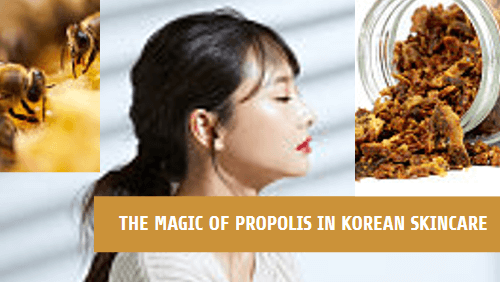
Oh my gosh I’ve never even heard of Propolis until now! Thank you for this, it was so informative! I’ve done some research in regard to allergies and bee’s – such as ingesting local honey to combat the symptoms of environmental allergies. Do you think the Propolis would have any effect on reducing allergy induced skin hives? I know you went over a ton of ways it is beneficial for you, I’m just curious if you have had any experience with this directly, as it is always something I am fighting. Thanks again for all the info!
Hi Destiny,
I’m glad you found my blog post helpful.
Propolis has many benefits for the skin, such as anti-inflammatory, antibacterial, antioxidant, and wound-healing properties. However, it can also cause allergic reactions in some people, especially those who are sensitive to bee products or have a history of eczema.
There is not much scientific evidence on the effect of propolis on allergy-induced skin hives, also known as urticaria. That said, some studies suggest that propolis may have anti-allergic and antihistamine effects, but more research is needed to confirm this. Therefore, I cannot say for sure if propolis would help you with your condition.
If you want to try propolis or any new product for your skin, I usually suggest doing a patch test first to see if you have any adverse reactions. You can apply a small amount of propolis product to a discreet area of your skin, such as behind your ear or on your inner arm, and wait for 24 hours. If you notice any signs of irritation, redness, itching, or swelling, you should stop using the product and consult your doctor. If you do not have any reactions, you can proceed with caution and use the product as directed.
I hope this answers your question.
Please note that this is not medical advice. You should always consult your doctor before using any new product or treatment for your skin. Thank you for reading my blog, and I hope you have a great day!
Cheers!
Martins